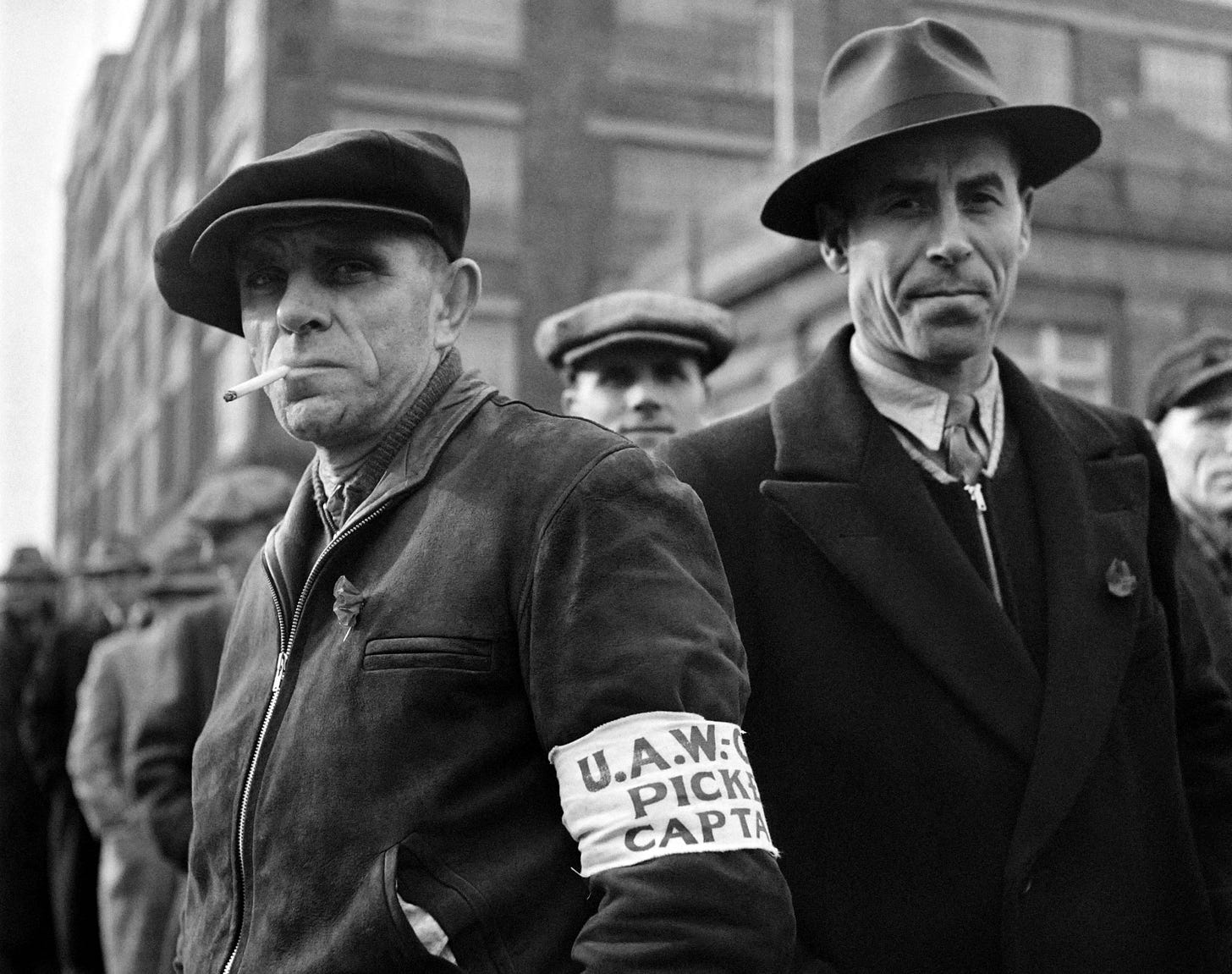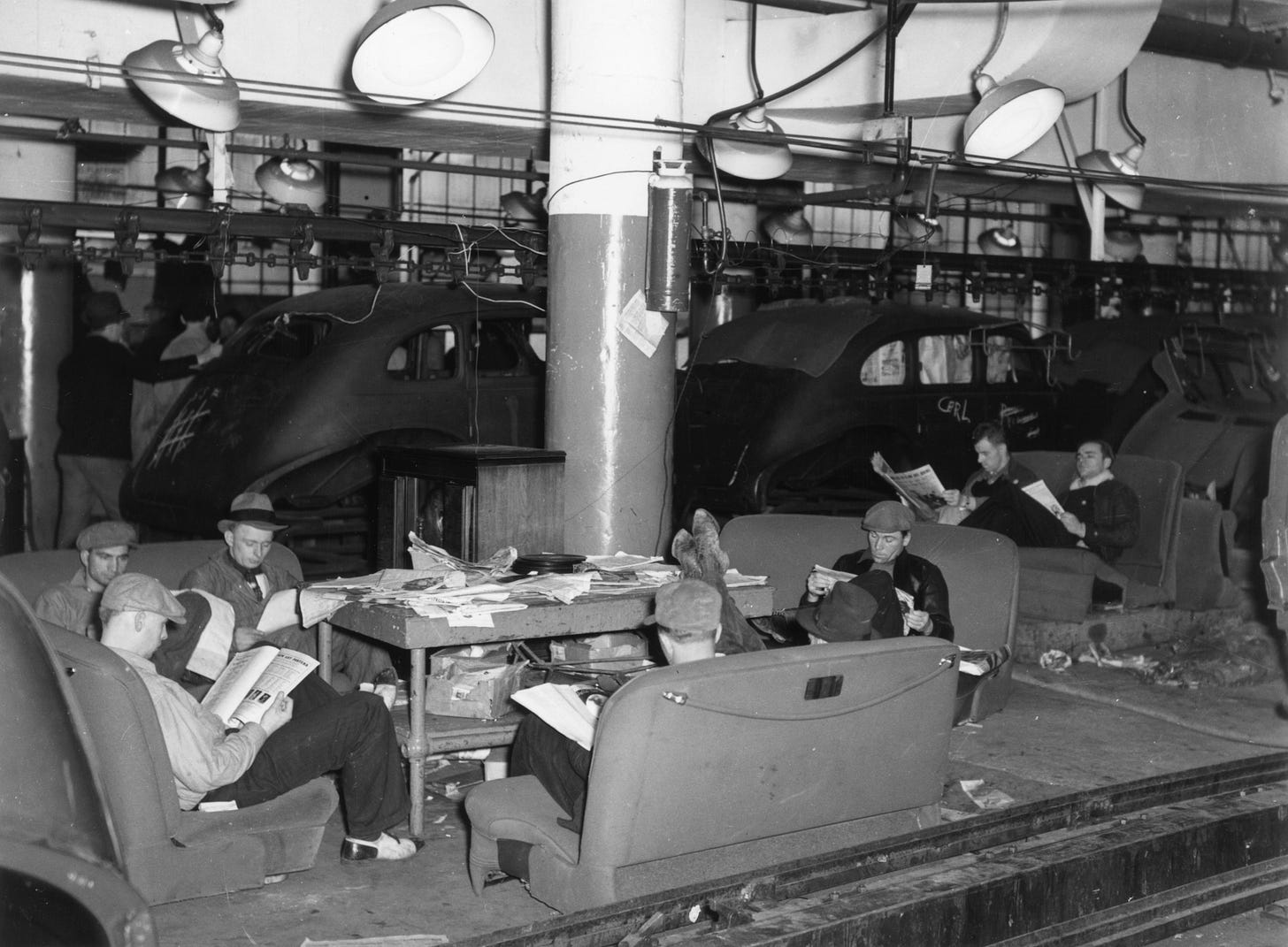Thinking Bigger About What Should Be Ours
"Management rights" and other fictions.
A lot has been said about the recently concluded (pending the membership’s vote) UAW strike, because there is a lot to say about it: About its tactics, about Shawn Fain and his advisors, about what comes next. I am not going to rehash every aspect of the strike here, but do want to talk a little bit more about the implications—which Barry Eidlen wrote about in Jacobin—of this strike for a question that your job has given an answer to, even if you don’t know it. Namely, “What does management get to decide?”
If you form a union at your job and go in to negotiate a union contract, the union staffer who helps you decide what to ask for will likely tell you that, per the law, there are two broad categories of things that you can bargain over. “Mandatory” subjects of bargaining are things that your employer has to negotiate with you—wages, hours, terms and conditions of employment, the things that make up your direct work experience. “Permissive” subjects of bargaining are everything else, from retirement benefits to diversity policies. Your employer is not legally obligated to negotiate these things with you. This does not mean they will refuse to negotiate it with you—most union contracts include all types of provisions for stuff that falls in the category of permissive subjects—but it means that the union cannot legally strike or declare an impasse over one of these subjects.
On top of this, most companies insist on including a “Management Rights” clause in any union contract. This clause essentially says: “Apart from the stuff specifically laid out in this contract, management has the exclusive right to manage the company.” This is one of the things, like the no-strike clause that prevents you from striking while the contract is in effect, that has evolved over time into a standard part of contracts, although there is no legal reason it must be. It is there just to make management’s life easier. It is there to make it perfectly clear that, yes, you are entitled to XYZ as clearly laid out in the contract, but other than that, the boss runs the place, and don’t you expect to waltz in here a year from now saying that you and the union want to tell us how to manage this business. It exists to stamp out any ambiguity about the fact that the union’s power is restricted to a very well delineated set of things. If you go into a contract negotiation and tell the company’s lawyer you don’t want a Management Rights clause, the lawyer will gesticulate and fume in comical way, because long precedent has gotten us to the place when this clause, as well as the union’s agreement not to strike, is accepted as part of the grand bargain that the company sees itself as purchasing by signing a union contract. That bargain is, “We will give you this money and stuff and in return you will agree to do the work and let us run the business as we see fit.”
This paradigm of what union contracts are is a lot better for workers than not having a union contract. No doubt about it. But as you can probably intuit, it also creates a rigid box that restricts what a union can do, and what a union is. If you ask a management-side lawyer what a union is, he’ll say something like, “A union is an entity that exists to carry out collective bargaining for an agreed-upon group of workers,” and then he’ll fuck off into his Porsche that he bought by helping CEOs see to it that thousands of people will spend their old age in poverty. Never be friends with a management-side labor lawyer.
This sort of narrow legalistic conception of a union is what companies want unions to be. But in fact, a union is much more than that. A union is a group of working people. Its strength comes from their solidarity, and from the fact that they do the work, and the work doesn’t get done without them, and they can make demands in exchange for doing the work, and they can stop doing the work if the demands aren’t met. And what can those demands be? Well, they can be anything that you can get the company to agree to. That is the fact that companies and their shit-eating lawyers do not want working people to spend very much time pondering. There is a legal framework that guides union negotiations, yes, but in reality, negotiations are not about law, but about power. A company might tell you that they don’t want to negotiate something with you, and that they don’t have to negotiate it with you because it is not a mandatory subject of bargaining. But if you and everyone else stop doing the work, there is no business. So the company will come around.
There is a well established concept called “Bargaining for the Common Good” that describes how many unions have used their power as a way to win things not just for themselves, but for their entire communities. Unions can, and do, take on a whole universe of issues—lower class sizes, nurses in schools, racial justice, affordable housing, access to healthy food, you name it—through the contract bargaining process. Often, these are public sector unions like teachers unions, who are closely identified with issues of public importance, and the political process, by their very nature. But private sector unions can bargain for the common good as well. Not only that, but if they are strong enough, they can bargain over the fundamental way that a company conducts its business. A union can look at all of the godlike powers that a company tries to reserve for itself in the “Management Rights” section and say… we have some ideas here, my friends. And we are going to make you do them.
The contracts that the UAW just won from the Big Three automakers include some eyebrow-raising things. They include the right to strike over plant closures, as well as an agreement to reopen a plant that Stellantis had idled last February. What you see in this is the union sticking its hand into the control room of a company, and reserving for itself a small measure of the power that executives would prefer to be theirs alone. It hints at a much broader conception of the role of unions in the workplace. Instead of the American corporate dictatorship model, in which an economically desperate work force humbly acquiesces to serve as meek robots at firms that are wholly controlled by well paid executives, it is possible to imagine a much more wise and humane model of capitalism (parts of which exist in more humane countries) in which every company has a strong union, which is the democratic representative of the workers, and which participates in true partnership with management to make decisions about how to run the firm. Many Americans reflexively think that this model is a bad idea, because they have never seen it in action. A bedrock part of capitalism’s propaganda, drilled into all of us from the day that we are old enough to start smiling at Coca-Cola ads, is the quasi-religious belief that a business is a sacrosanct thing run by its owner. That, of course, is a fiction when it comes to big companies, which have been run for decades now exclusively for the benefit of investors and executives, a trend that has created an inequality crisis and generally fucked America in myriad ways. Many people will act alarmed at the prospect of a union participating in management decisions, because they think that the union would just make self-serving choices, while being fine with a situation in which a tiny group of executives makes much more destructive self-serving choices instead.
Letting the workers participate in the management of a company would be an infinite improvement. As you know if you have ever had a job, the people who do the work often have a more accurate idea of a company’s operations than the owners do. Union input on facility closures, union input on capital investment decisions, union board seats… all of these possibilities stretch out before us, tantalizingly. The UAW contract is just a hint of what a powerful industrial union can do. If you have ever thought to yourself, “My boss is dumb, and his decisions are dumb, and I actually know more about how this place runs than he does, yet he makes 365 times as much money as I do,” I encourage you to unionize your workplace. Then unionize the other companies in your industry. Then come together in an industry-wide work stoppage to demand that you, the workers, who do the work, and who know how the work is done, be allowed to participate in the decisionmaking processes of the company.
Management rights are just made up. Companies do not have any rights that we don’t give them. If are doing something that makes a management-side attorney cry and moan, you are clearly on the right track.
Also
I wrote a piece for MSNBC yesterday about the UAW strike as well, and what comes next for the union. There is so much to say about what’s happening with the UAW right now. We didn’t even talk about their call for unions to line up their contract expiration dates to set up a May Day 2028 general strike!!! That’s big. That’s the vision we need. We will discuss this more, I promise.
SAG-AFTRA is still on strike. The longer these strikes go, the more important it is to give the workers on the picket line your support. All the info you need to join them on a picket line or find other ways to support them can be found here.
My last post was a six month update on the progress of this site you are reading, How Things Work. Thank you to the many people who gave me feedback about the site after that post, especially the reader who warned me against including more conversational content here by saying, “In my opinion, you have an abrasive personality and it would hurt more than help.” That is the type of analytical honesty that makes the How Things Work community universally revered. Quite a few readers also chose to become paid subscribers after that post discussed the fact that this place is kept alive by paid subscribers. This support was heartwarming. If you would like to join the fearless and outspoken community of socialist-minded readers who help How Things Work remain paywall-free, please consider becoming a paid subscriber as well. Together, we will prevail.




I don't know you, obviously, but I like your "abrasive" personality. You just seem honest and real, and I appreciate it. Also enjoy language like "shit-eating lawyers." That feels real too. I'll be turning into a paid subscriber soon. But I have pre-ordered the book! Thank you for your work.
As if you would recount personal stories of flipping off other drivers or some such.
Today's post has made me curious about "employee-owned" companies. Publix states that it's 80% employee-owned. They hire a CEO (who is well paid, but not as well paid as Kroger's CEO). The founding family holds 20%, which probably gives them meaningful control. Something for me to go down a rabbit hole or two about.
The corporate/shareholder model isn't the only one, as anyone with a credit union membership/account can attest to. CU's aren't perfect, and I don't know how many are unionized, but I'm happy letting them hold my money.
The May 2028 target date is very interesting - early enough in an election year to possibly have some effects.